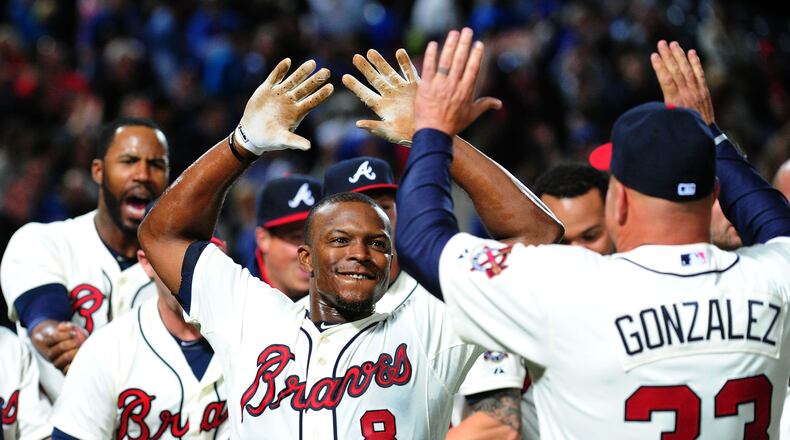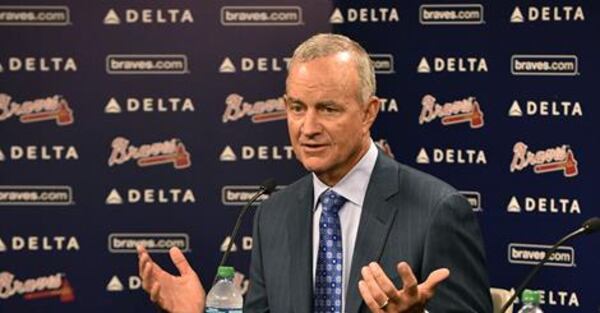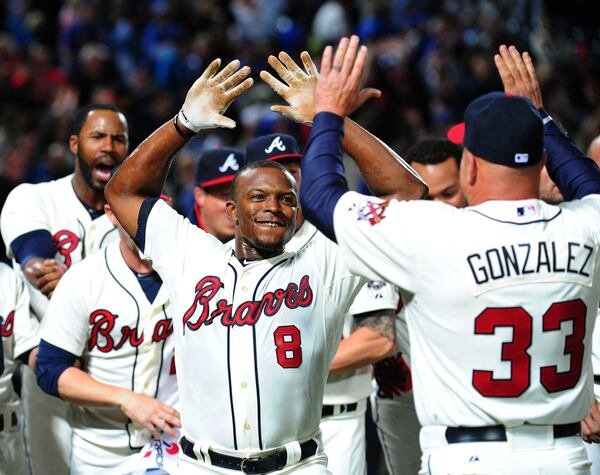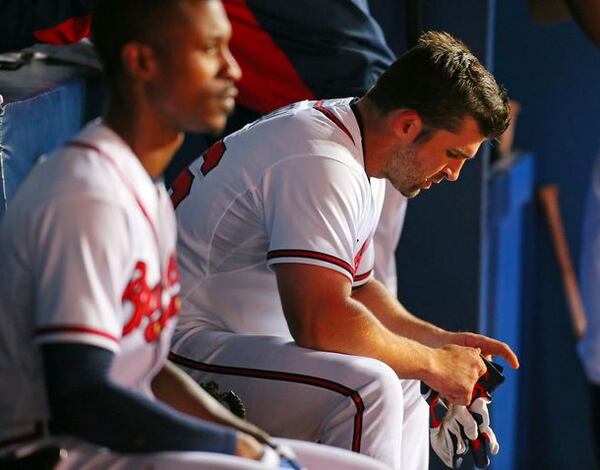PHOENIX – They came, they signed (some minor league free agents), they talked, they planned, they left.
Now things get interesting.
Braves president of baseball operations John Hart and all of his top aides left the general managers meetings by Thursday morning with a clear sense of the looming task of reshaping their roster for 2015 and, more importantly (let’s be honest), for 2017 and beyond in their new ballpark.
Hart is 66, and showed more energy than some other GMs barely half his age. He also conveyed more confidence, humor and enthusiasm than some might expect from any man thrust into his situation.
And candor.
Oh, the candor. Those who cover the Brave have not been used to that in recent memory, and it was refreshing, to say the least. This is a man clearly secure in his position, who's been there and done that a lot of times, and who is not worried about letting folks know what factors and constraints are shaping decisions and potential moves ahead.
“One thing that we’ve looked at and we’ve talked about is that quite clearly we’re wearing some bad contracts,” Hart said, one of several times that he reminded Atlanta or national writers that roster-building for the immediate future is hindered by the nearly $28 million the Braves owe Dan Uggla and B.J. Upton in 2015, with Uggla gone and Upton seemingly untradeable two woeful seasons into a five-year contract.
“And so your ability economically to maybe play in the free-agent game is going to be more restricted," Hart said. "So we’re looking at certain levels of free-agent starters. I would assume as we finish up these meetings, we’ll have a pretty good idea at what other clubs are looking to do. The free-agent market is not going to move rapidly. I think we’re going to get more defined as we get closer to the Winter Meetings. We’re going to get a sense of where we are or are not in potential trade talks, which I think will affect what we do with some of our own players.” (In other words, how many Braves players will get traded.)
By the last full of day of the meetings Wednesday, Hart had talked to enough representatives of free-agents, and enough officials from other teams, to have a good idea of what the Braves’ options might be in the coming weeks. And if he wasn’t ready to say if the Braves are going to go into rebuilding mode – which seems likely – he was willing to explain why they might, and how this situation differs from a rebuild he did after taking over in Cleveland more than two decades ago.
One of those differences: The Indians had enough major-league ready players in the upper levels of their minor league system to fill in the cracks along with players that might be acquired in trades as part of a full-scale break-it-down-and-rebuild. The Braves don’t have many – if any -- of those major-league ready prospects in the upper minors.
(This is me talking, not Hart: I’d add that they also have several high-level young players -- Freeman, Simmons, Kimbrel, Teheran -- who nine months ago signed long-term deals, so a full-on stripdown and rebuild wasn’t going to happen with this team anyway. It’s not necessary, and it would be very awkward indeed, since several guys fresh off signing long-term deals suddenly playing for a 90-100-loss team.)
OK, now back to Hart:
"In Cleveland when we knew we weren't going to win, we traded (a lot of players). The difference was that, part of that (strategy) is, you get your trade pieces back and the other thing you feel confident in, you've got upper-level guys that you feel can step in and help you right now. We don't. So that's a part of our equation that you look at.
“I think when I seriously look at this (Braves) club, does it have a chance to win? Yeah. But it has a gaping hole. I mean, we’re in a division that is pitching-rich, and right now we’re pitching-poor. So, that’s going to be a part of the equation, as to what we are able to do between now and San Diego when we go out to the Winter Meetings.”
Hart said that if the Braves were able to acquire a couple of quality starting pitchers in the next few weeks, they might veer away from a true rebuilding mode and still be competitive next season in what figures to be a tougher NL East with improved Mets and Marlins squads in addition to the reigning champion Nationals.
Whatever the eventual stated goal is, it became pretty clear to me the past few days that the Braves are likely to trade at least one of their corner outfielders, Jason Heyward and Justin Upton, both of whom are eligible for free agency a year from now and can probably expect to command long-term contracts worth at least a combined $35 million annually and perhaps closer to $40 million annually.
Rather than face the likelihood of both leaving as free agents and the Braves getting only a draft pick for each as compensation when they sign elsewhere, the Braves have a chance to fill holes in their roster and high minors by getting young players in return for those two, perhaps getting a potential young ace back in a trade, or a second baseman on a one-year deal (in which case they could trade Tommy La Stella) t0 bridge the gap until Jose Peraza is ready.
There are so many ways all of this could go, and it's impossible for any of us outside the Braves inner circle to predict this early in what is a rather unique offseason for a team in transition in more ways than one. (Actually, it's probably just about impossible for even members of the front-office inner circle to predict at this point, at least until we get closer to the Winter Meetings in 3 1/2 weeks.)
The only thing that would surprise me is if the Braves don’t trade at least one of those two corner outfielders. If they trade both, I would not be surprised. If they trade Evan Gattis, I won't be surprised, but I think Justin Upton and Heyward each is more likely to be dealt.
It’s tough to get a read on the situation with Gattis, but it’s pretty clear to me after conversations with Hart that the Braves intend to play him primarily in left field next season if he’s not traded. And that Hart is reluctant to trade him because big-time power like Gattis has is scarce in the post-steroid era, and because Gattis is still a year from arbitration and has four years under contractual control of the Braves.
But with so many teams, particularly American League teams, interested in the big slugger, it might be difficult for the Braves to resist if a team makes an offer that blows their doors off.
The Braves’ tradeable pieces include more than just J-Up, J-Hey and El Oso Blanco. For instance, just about anyone in the bullpen not named Craig Kimbrel.
“Everybody mentions the two outfielders (as trade targets), but there’s other pieces on this club that we might consider (trading),” Hart said. “There’s some bullpen pieces below Kimbrel. We’ve got some pieces that people like, it’s just a matter of trying to the right guys back where you’re going to say, this will allow us to win, or at least allow us to compete. That’s where we are this early in the winter. And I think it’d be a shame on us if we didn’t go out and explore that avenue first. Go out and see if we can make a deal to get pieces that we like.
“That will, even though we’ve got to subtract something, will still give the club a chance to compete.”
If they can’t make the trade acquisitions they want to make to fill out the starting rotation, Hart and Co. would face a more difficult task.
“If we’re unable to find that (through trades) we look at the free-agent market,” he said. “And then the other piece is you’ve got the anchor of the economics – Danny Uggla’s $13 million, B.J. Upton’s $15 million – and you go, how deep can we go in the starting pitching market? So that’s going to be a piece of it. Fortunately there might be some guys hanging out there in January or February and we can make a strike on somebody.
“The missing piece right now on this club is starting pitching. Not just depth, but starting pitching.”
Hang on, folks. Could be a bit of a wild ride ahead. At the very least, it'll be an interesting offseason.
I'm shutting it down here at the Biltmore, headed to the airport and home to Atlanta. Warm things up there before I get home, OK? I'll close with this cut from our man Jason Isbell, off his terrific Southeastern album.
I've heard love songs make a Georgia man cry
on the shoulder of somebody's Saturday night
Read the good book, studied it too
but nothing prepared me for living with you
Lock me up tight in these shackles I wear
tied up the keys in the folds of your hair
And the difference with me is I used to not care
Stockholm let me go home
Once a wise man to the ways of the world
now I've traded those lessons for faith in a girl
Crossed the ocean, thousand years from my home
in this frozen old city of silver and stone
Ships in the harbor and birds on the bluff
don't move an inch when their anchor goes up
And the difference with me is I've fallen in love
Stockholm let me go home
Let me goAnd the night, so long, I used to pray for the daylight to come
Folks back home surely have called off the search and gone back to their ownShips in the harbor and birds on the bluff
don't move an inch when their anchor goes up
And the difference with me is I've fallen in love
Stockholm let me go home
Let me go
Let me go home





